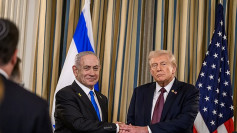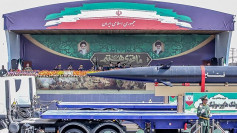President Donald Trump and Israeli Prime Minister Benjamin Netanyahu are set to meet at the White House on Monday amid growing expectations that the two leaders could unveil a deal to halt Israel's offensive in Gaza and secure the release of remaining hostages. White House officials say gaps between the U.S. and Israel narrowed significantly during weekend talks with senior adviser Steve Witkoff and Trump's son-in-law Jared Kushner, raising the likelihood of a joint announcement. "We're doing very well. It looks like there is a really good chance for peace in the Middle East," Trump told NBC News on Sunday. "Everybody is on board. Everybody."
The potential agreement represents the most significant diplomatic test yet for Netanyahu since Israel launched its war in Gaza nearly two years ago. Israeli forces continue their assault on Gaza City despite international condemnation, famine warnings, and moves by several Western nations - including the U.K., France, and Canada - to formally recognize a Palestinian state. Netanyahu told world leaders at the U.N. on Friday that Israel "must finish the job" in Gaza, prompting dozens of delegates to walk out.
Trump advisers say Netanyahu is facing an increasingly stark choice. "The Arabs have agreed to it like 100%," a senior Trump aide said. "Now we're waiting for the president to work his magic on Netanyahu." The aide added that if the Israeli leader rejects the plan, the White House will view him as responsible for prolonging the conflict and humanitarian crisis: "People will continue to starve. Let's hope we get there."
The negotiations follow months of mounting frustration within Trump's circle over Netanyahu's decisions, including an Israeli strike in Qatar that targeted Hamas leaders and briefly derailed talks. One senior official described Netanyahu's behavior as "invading and bombing every country on the map," claiming he is motivated partly by domestic political pressures, including his ongoing corruption trial.
Trump has also publicly ruled out allowing Israel to annex the occupied West Bank, signaling a rare willingness to pressure Netanyahu in public. "I will not allow Israel to annex the West Bank. Nope, I will not allow it. It's not going to happen," Trump told reporters last week, a move that reassured Arab leaders who warned annexation could unravel the Abraham Accords.
Key sticking points remain. Hamas has insisted it will only release the roughly 48 hostages still held in Gaza - 20 of whom are believed to be alive - in exchange for a permanent ceasefire and Israeli withdrawal. On Sunday, Hamas' Qassam Brigades said it had lost contact with two captives due to Israeli operations in Gaza, urging Israel to halt airstrikes temporarily to allow recovery efforts. The Hostages and Missing Families Forum said it is working with authorities to verify the claims.
Trump has framed the Gaza deal as central to his broader Middle East strategy, presenting a 21-point peace plan to Arab nations on the sidelines of the U.N. General Assembly last week. He wrote on Truth Social, "We have a real chance for GREATNESS IN THE MIDDLE EAST... FIRST TIME EVER. WE WILL GET IT DONE." Monday's meeting will include lunch and a press conference, with both leaders expected to address whether Hamas will endorse the proposal and whether a 60-day ceasefire could soon take effect.






